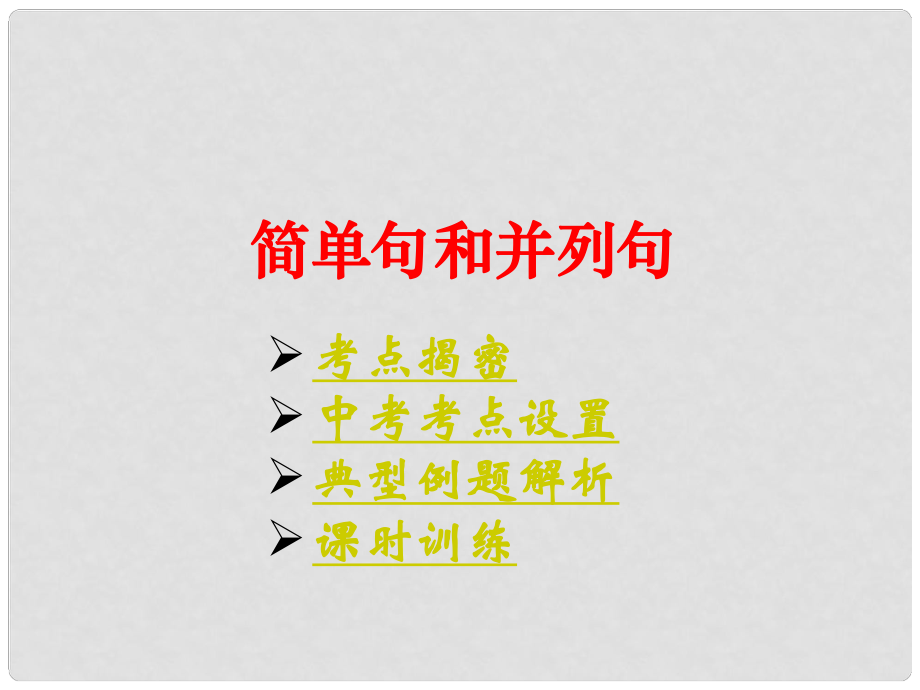《云南省麗江市永勝縣永北鎮(zhèn)中學(xué)中考英語復(fù)習(xí) 簡單句和并列句課件》由會員分享���,可在線閱讀�,更多相關(guān)《云南省麗江市永勝縣永北鎮(zhèn)中學(xué)中考英語復(fù)習(xí) 簡單句和并列句課件(16頁珍藏版)》請在裝配圖網(wǎng)上搜索��。
1�、簡單句和并列句簡單句和并列句考點揭密考點揭密中考考點設(shè)置中考考點設(shè)置典型例題解析典型例題解析課時訓(xùn)練課時訓(xùn)練 考點揭密考點揭密(一一)簡單句簡單句 由一個主語由一個主語(或并列主語或并列主語)和一個謂語和一個謂語(或并列謂語或并列謂語)所所構(gòu)成的句子叫簡單句,其結(jié)構(gòu)是主語構(gòu)成的句子叫簡單句�����,其結(jié)構(gòu)是主語+ 謂語。謂語���。 (二二)并列句并列句 由并列連詞把兩個或兩個以上的互相關(guān)連而又互相由并列連詞把兩個或兩個以上的互相關(guān)連而又互相獨立的獨句獨立的獨句(即簡單句即簡單句)連在一起而構(gòu)成的句子叫并列連在一起而構(gòu)成的句子叫并列句��。其結(jié)構(gòu)是:簡單句句�����。其結(jié)構(gòu)是:簡單句+并列連詞并列連詞+簡單句簡單句 常
2�����、用的連詞有常用的連詞有and,but,or not only.but also,neither.nor,either.or 中考考點設(shè)置中考考點設(shè)置(一一)簡單句簡單句 1.主語��、謂語在人稱與數(shù)上的一致性�����。主語�、謂語在人稱與數(shù)上的一致性����。 and連接兩個并列主語時為復(fù)數(shù),謂語動詞也相應(yīng)地連接兩個并列主語時為復(fù)數(shù),謂語動詞也相應(yīng)地使用復(fù)數(shù)形式����,但:使用復(fù)數(shù)形式,但: (1)如果如果and連接的兩個名詞是不可數(shù)名詞且前面都沒連接的兩個名詞是不可數(shù)名詞且前面都沒有冠詞�,若兩個詞表示一個事物或一個概念�����,謂語動詞有冠詞��,若兩個詞表示一個事物或一個概念��,謂語動詞要用單數(shù)��;如果兩個詞表示的是兩個事物或兩個概
3�����、念����,要用單數(shù);如果兩個詞表示的是兩個事物或兩個概念�����,謂語動詞則要用復(fù)數(shù)。謂語動詞則要用復(fù)數(shù)�����。 (2)如果如果and連接的是兩個可數(shù)單數(shù)名詞��,前一個有冠連接的是兩個可數(shù)單數(shù)名詞����,前一個有冠詞,后一個沒有冠詞����,意味著一個人或詞,后一個沒有冠詞��,意味著一個人或 事物��,謂語動事物����,謂語動詞要用單數(shù)。詞要用單數(shù)���。 (3)當(dāng)當(dāng)and連接的兩個名詞前都有連接的兩個名詞前都有each�����,every����,many a,no等單數(shù)概念的限定詞修飾時等單數(shù)概念的限定詞修飾時(第二個名詞前的修飾第二個名詞前的修飾詞有時可以省略詞有時可以省略)����,謂語動詞要用單數(shù)�。,謂語動詞要用單數(shù)���。 中考考點設(shè)置中考考點設(shè)置2.陳述句與疑問
4�����、句的轉(zhuǎn)換����。陳述句與疑問句的轉(zhuǎn)換����。3.選擇疑問句�����。選擇疑問句�。4.反意疑問句��。反意疑問句��。(1)陳述句陳述句+省略問句省略問句(2)祈使句祈使句+附加疑問句附加疑問句(3)反意疑問句的回答反意疑問句的回答 中考考點設(shè)置中考考點設(shè)置(二二)并列句并列句 (1)并列連詞的選用���。并列連詞的選用�����。 (2)并列連詞與從屬連詞的區(qū)別���。并列連詞與從屬連詞的區(qū)別。 【例例1】 John likes walking in the open air, . (2001�����,吉林����,吉林) A.so does Tom B.also does Tom C.tom likes also D.so Tom does 典型例題解析典
5�、型例題解析【例例3】 There will be a volleyball match in our school, ? 2002�����,福州�����,福州 A.be there B.is there C.will there D.wont there A【例例2】 Joke broke his leg����,_?2001����,南京,南京 A.did he B.didnt he C.do you D.dont you BD 【例例4】 Neither he nor I_from Canada. We are from Australia.2002�����,山西����,山西 A.is B.are C.am D.be 典型例題解析典型
6��、例題解析C 【例例5】 There is a lot of_in the box 2002����,吉林��,吉林 A.cake B.bags of cakes C.milk D.bags of milk C1.We cant live_water. A.with B.has C.havent D.without2.We must hurry��,_we will be late for school. A.and B.or C.but D.if3._you_she are like English. A.Both.and B.Neither.nor C.Either.or D.Not only.but al
7����、so4.The number of the students_50. A.are B.am C.is D.have5.He was tired,_he still went on working. A.and B.but C.or D.also 課時訓(xùn)練課時訓(xùn)練(D)(B)(A)(C)(B) 課時訓(xùn)練課時訓(xùn)練6._Lily_Lucy can go with you. Because one of them must look after their mother at home. A.Neither.nor B.Either.or C.Both.and D.No tonly.but also7
8、.Will you go and get some more_for the teacher? A.chalks B.piece of chalk C.pieces of chalk D.pieces of chalks8._is made of _. A.Glasses�,glasses B.A glass,glass C.Glasses��,glasses D.A glass���,glasses9.We are very tired,we should have_rest. A.half an hour B.an hour C.half a hours D.an hours10.I heard he
9����、r_in the next room. A.singing B.sang C.go sing D.sing (B)(C)(A)(A)(A)11.I usually have breakfast at home. _. A.So have I B.So do I C.I have so D.I do so12.Open the door��,_? A.will you B.wont you C.dont you D.do you13.Sheep live on grass�����,_? A.doesnt it B.dont they C.does it D.do they14.He found_intere
10、sting to learn English. A.it B.this C.that D.those15.Why_the information on the Internet. A.not search B.search C.dont search D.do search 課時訓(xùn)練課時訓(xùn)練(B)(B)(B)(A)(A)16.You usually play football after school,dont you? _.But today I want to read English. A.Yes��,I do B.No,I dont C.No,I dont D.No��,I do17._goo
11��、d weather it is today! A.How B.How a C.What D.What a18.He hasnt finished the work yet,has he? _.He finished it yesterday. A.Yes,he has B.No,he hasnt C.Yes,he hasnt D.No,he has19.I didnt finish my homework yesterday.He didnt finish his homework,_. A.too B.also C.either D.well20.Lets talk about the pi
12����、cture,_? A.will you B.wont you C.shall we D.shant we 課時訓(xùn)練課時訓(xùn)練(A)(A)(A)(C)(C)21.Its a beautiful day. _. A.so is it B.so it is C.so does it D.so it does22.There is going to _a sports meeting next week. A.have B.has C.hold D.be23._exciting the news is ! A.What B.What an C.How D.How an24.The weather in
13、Beijing is worse than _ in Nanjing. A.that B.those C.it D.this25._TV is my mothers hobby. A.Watch B.Watching C.Seeing D.See 課時訓(xùn)練課時訓(xùn)練BDACB句型轉(zhuǎn)換句型轉(zhuǎn)換1.The mountain is very beautiful.(改為感嘆句改為感嘆句)_ _beautiful mountain it is!2.How is the weather in China?(改為同義句改為同義句)_the weather _in China.3.The boy is the
14����、most careless in his class.(改為同義句改為同義句)The boy is _ _than _boy in his class.4.He didnt watch TV,his mother didnt either.(改為同義句改為同義句)_he _his mother watched TV.5.I spent the whole afternoon learning English.(同上同上)I spent _ _ _learning English. 課時訓(xùn)練課時訓(xùn)練What a Whats like more carelessany other Neither
15�、norall the afternoon6.I spent 100 yuan on the coat.(同上同上) I _100 yuan _the coat. I _100 yuan _the coat. The coat _me 100 yuan.7.He has worked in this school since 2 years ago. (對劃線部分提問對劃線部分提問)_ _has he worked in this school.8.He joined the aray 3 months ago.(改為同義句改為同義句)_ _3 months since he joined th
16�、e aray.3 months _ _since he joined the aray.He _ _ _the aray for 3 months.9.The visitors had a good time in Beijing.(同上同上)The visitors _ _in Beijing.10.He will come back in a week.(對劃線部分提問對劃線部分提問)_ _will he come back? 課時訓(xùn)練課時訓(xùn)練 paid for spent buying cost How longIt ishas been inenjoyed themselvesHow
17、soonhas passes11.He has never been abroad.(改為反意疑問句改為反意疑問句) He has never been abroad����,_ _?12.Dont go alone.(改為反意疑問句改為反意疑問句) Dont go alone,_ _?13.There is little meat in the fridge.(改為反意疑問句改為反意疑問句) There is little meat in the fridge,_ _?14.Why not ask the man over there?_ _ _ask the man over there?15.How many people are there in India?_ _ _of India? 課時訓(xùn)練課時訓(xùn)練has hewill youisnt thereWhy dont youWhats the population
 云南省麗江市永勝縣永北鎮(zhèn)中學(xué)中考英語復(fù)習(xí) 簡單句和并列句課件
云南省麗江市永勝縣永北鎮(zhèn)中學(xué)中考英語復(fù)習(xí) 簡單句和并列句課件

